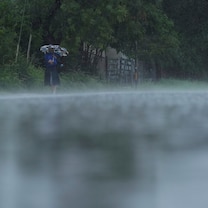Experts: 'Mind Over Matter' May Have Played Part in Chicago Marathon
There was humidity, heat and lack of water. Then there were the runners.
Oct. 9, 2007 — -- In the race to the finish line, nearly all marathon runners will experience small bumps along the way — blisters, stomach cramps, even bloody nipples.
But this weekend, the Chicago Marathon shut down early after an unusually hot Midwest day appeared to catch organizers, and runners, off guard.
Some experts now wonder whether a more critical look should be taken of the runners, who in the face of the brutal conditions, may have lacked a little "common sense." Others wonder whether races this size should require participants to prove they are fit enough to run a marathon.
During Sunday's race, when temperatures soared to the high 80s, about 50 people were taken to hospitals. Hundreds more were treated on the course for heat-related illnesses. Many runners complained about a lack of water and said race officials were not prepared for the heat.
At least five people remained hospitalized Monday evening, The Associated Press reported.
Chicago marathon officials insisted they saw the heat wave coming and added extra water, ice and misting stations. But one official told the AP that perhaps they should have placed more water earlier on the course and that they did not anticipate so many would use water to douse themselves.
"It is very easy to blame the organizers," Jeffrey Sankoff, an emergency room attending physician and an experienced triathlete, told ABCNews.com. "What happens in a lot of these races [is that] people get focused on their time. It's often more of a problem for the experienced athletes than the novice runners."
According to Sankoff, who was also the assistant medical director at last year's Colfax Marathon in Denver, runners often spend so much time training for a marathon that they may not want to stop — even when they're told to, by their bodies or by the race organizers.
"It's very easy to spend time shooting for a goal and when you get to the race you may not pay attention to the kinds of signals that your body is giving you when it's telling you to stop. … It's tough," he said.
That's what happened to Mark Roberts, a 37-year-old engineer in Memphis, Tenn., when organizers announced that the race was over and that he should stop running — he still had 6.2 miles left to the finish line.
"At the end — mile 20, they said the course is closed, make sure you stop at the next aid station. It might be the last time you can get water or Gatorade," Roberts told ABC News. "After training for three months … when you get that close to the end, you want to finish your race."



